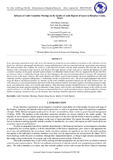Please use this identifier to cite or link to this item:
http://ir-library.mmust.ac.ke:8080/xmlui/handle/123456789/2299Full metadata record
| DC Field | Value | Language |
|---|---|---|
| dc.contributor.author | Limonya, Joel Okinyi | - |
| dc.contributor.author | Byaruhanga, John | - |
| dc.contributor.author | Musiega, Maniagi | - |
| dc.date.accessioned | 2023-10-05T06:32:19Z | - |
| dc.date.available | 2023-10-05T06:32:19Z | - |
| dc.date.issued | 2023-09-22 | - |
| dc.identifier.uri | https://doi.org/10.51867/ajernet.4.2.27 | - |
| dc.identifier.uri | https://ajernet.net/ojs/index.php/ajernet/article/view/95 | - |
| dc.identifier.uri | http://ir-library.mmust.ac.ke:8080/xmlui/handle/123456789/2299 | - |
| dc.description.abstract | Every operating organization keeps tabs on its development by producing accurate financial statements at the conclusion of each fiscal year, which are subsequently distributed to various individual users who are concerned with the organization's development. The audit procedure then confirms the accuracy of the financial accounts, and the audit committee then provides the specific business with a transparent audit report to seal the deal. The main objective of this study was to examine the influence of audit committee meetings on the quality of audit reports at Sacco’s in Homabay County, Kenya. This was supported by the fact that there are numerous Sacco’s in Homabay County, many of which had apparently experienced audit problems in the past. The institutional theory served as the study's compass. This study adopted a descriptive causal research design; the target population was 104 audit committee members of deposit taking Sacco’s in Homabay County as of December 2021. Out of the target population determined using the Krejcie and Morgan formula, 82 members of the audit committee provided responses for the study. Primary data was collected using a research questionnaire that involved the drop-and-pick method. Descriptive statistics, including a frequency table, mean, and standard deviation, were used for data analysis, while inferential statistics included Pearson’s correlation analysis. The study found that audit committee meetings in Homabay County, Kenya, had a positive and significant impact on the caliber of audit reports on Sacco’s (r = 0.568, p<0.05). The study recommends that Sacco’s audit committee members should conduct the maximum number of meetings as much as they can. In extension, those meetings should be objectively aimed at attaining quality audits | en_US |
| dc.language.iso | en | en_US |
| dc.publisher | AFRICAN JOURNAL OF EMPIRICAL RESEARCH | en_US |
| dc.subject | Influence, Audit Committee, Meetings, Quality,Audit Reports, Saccos, County, | en_US |
| dc.title | Influence of Audit Committee Meetings on the Quality of Audit Reports of Saccos in Homabay County, Kenya | en_US |
| dc.type | Article | en_US |
| Appears in Collections: | Gold Collection | |
Files in This Item:
| File | Description | Size | Format | |
|---|---|---|---|---|
| Influence+of+Audit+Committee+Meetings+on+the+Quality+of+Audit+Reports+of+Sacco’s+in+Homabay+County,+Kenya+-+Limonya+et+al..pdf | 661.67 kB | Adobe PDF |  View/Open |
Items in DSpace are protected by copyright, with all rights reserved, unless otherwise indicated.
